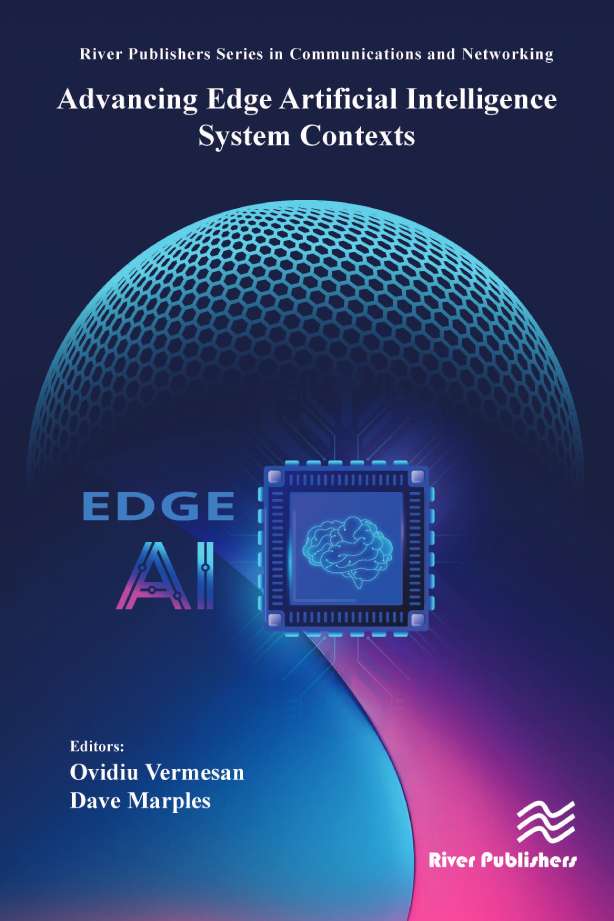River Publishers Series in Communications and Networking
Advancing Edge Artificial Intelligence
System Contexts
Editors:
Ovidiu Vermesan, SINTEF, Norway
Dave Marples, Technolution B.V., The Netherlands
ISBN: 9788770041027 (Paperback) e-ISBN: 9788770041010
The intersection of AI, the Internet of Things (IoT) and edge computing has kindled the edge AI revolution that promises to redefine how we perceive and interact with the physical world through intelligent devices. Edge AI moves intelligence from the network centre to the devices at its edge, entrusting these endpoints to analyse data locally, make decisions, and provide real-time responses.
Recent advances in power-efficient high-performance embedded silicon make edge AI a viable proposition, albeit one requiring new distributed architectures and novel design concepts. Moving decision-making closer to the edge makes responses faster and systems more reliable, while the constant pressure to reduce network bandwidth demand and the need to contain spiralling data storage and operations costs help justify the engineering investment necessary to embrace this new paradigm. Further, moving to decentralised operation opens the door to a multitude of novel applications, covering immersive technologies and autonomous systems across fields as diverse as healthcare and industrial automation, personal assistance and prognostics, surgery, and process control. In the best tradition of systems engineering, the first stage of this transition process is understanding the application domain for edge AI deployment, the "system context".
This book presents some key topics and early thinking from the EdgeAI* project, covering data backhaul technologies, lifecycle management, mechanisms for developing AIs at the edge and techniques for interacting with those AIs. It provides examples of application domains before concluding with a review of how edge AI systems can be understood by their users. It also examines and presents new results based on current investigations and activities in edge AI technologies, considering the future trends in autonomic systems, hyperautomation, AI engineering, generative AI, connectivity, and cybersecurity mesh.
This book also aims to empower the reader with the knowledge and insights needed to understand and embrace the transformative power of edge AI technology. The extensively referenced chapters, contributed by experts and thought leaders in the field, are recommended to anyone interested in developing edge AI systems.
*Edge AI Technologies for Optimised Performance Embedded Processing” (EdgeAI) Key Digital Technologies (KDT) Joint Undertaking (JU) European research project. https://https://edge-ai-tech.eu/
Recent advances in power-efficient high-performance embedded silicon make edge AI a viable proposition, albeit one requiring new distributed architectures and novel design concepts. Moving decision-making closer to the edge makes responses faster and systems more reliable, while the constant pressure to reduce network bandwidth demand and the need to contain spiralling data storage and operations costs help justify the engineering investment necessary to embrace this new paradigm. Further, moving to decentralised operation opens the door to a multitude of novel applications, covering immersive technologies and autonomous systems across fields as diverse as healthcare and industrial automation, personal assistance and prognostics, surgery, and process control. In the best tradition of systems engineering, the first stage of this transition process is understanding the application domain for edge AI deployment, the "system context".
This book presents some key topics and early thinking from the EdgeAI* project, covering data backhaul technologies, lifecycle management, mechanisms for developing AIs at the edge and techniques for interacting with those AIs. It provides examples of application domains before concluding with a review of how edge AI systems can be understood by their users. It also examines and presents new results based on current investigations and activities in edge AI technologies, considering the future trends in autonomic systems, hyperautomation, AI engineering, generative AI, connectivity, and cybersecurity mesh.
This book also aims to empower the reader with the knowledge and insights needed to understand and embrace the transformative power of edge AI technology. The extensively referenced chapters, contributed by experts and thought leaders in the field, are recommended to anyone interested in developing edge AI systems.
*Edge AI Technologies for Optimised Performance Embedded Processing” (EdgeAI) Key Digital Technologies (KDT) Joint Undertaking (JU) European research project. https://https://edge-ai-tech.eu/
Edge AI, AI explainability, AI interpretability, explainable AI, XAI, trustworthy edge AI.
Efficient AI-based Attack Detection Methods
for Sensitive Edge Devices and Systems
by Daniel Hirsch, Falk Hoffmann, Andrija Neskovic,
Celine Thermann, Rainer Buchty, Mladen Berekovic,
and Saleh Mulhem
